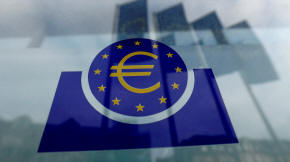|
Investors were ramping up their bets on higher ECB rates after
the Federal Reserve raised the cost of borrowing late on
Wednesday, tightening its stance for the first time since the
start of the coronavirus pandemic and despite uncertainty
stemming from Russia's invasion of Ukraine. [GVD/EUR]
Central banks worldwide have been caught on the hop by a surge
in inflation, which hit 5.9% in the 19-nation euro zone last
month after spending most of the last decade below the ECB's 2%
target.
But, in a repeat of last week's message, Lagarde said that any
increase in the ECB's policy rate will be gradual and come only
"some time" after its bond-buying programme, which should happen
in the third quarter of the year barring more financial turmoil.
"This maintains our traditional sequencing logic, but also gives
us extra space if needed after we stop purchasing bonds and
before we take the next step towards normalisation," she told a
conference in Frankfurt.
Money markets were pricing in increases worth nearly 50 basis
points to the ECB's deposit rate by the end of this year, which
would take it back to zero after eight years in negative
territory.
The ECB has said it needs to be confident that inflation in the
euro zone, including core measures that exclude volatile
components such as energy and food prices, stabilises at 2%
before raising rates.
Speaking after Lagarde, the ECB's chief economist Philip Lane
said core inflation, which came in at 2.9% in February, would
likely fade over time as fuel costs level off.
Lane estimated that around 80 basis points of core or underlying
inflation was purely down to the energy price shock.
He added that market-based expectations of long-term inflation,
which hit 2.3% earlier this week, were actually still below the
ECB's goal once the risk premium - or compensation demanded by
investors at times of uncertainty - was taken out.
Lagarde added that the ECB could devise new tools to ensure
monetary policy reaches all corners of the euro zone even as it
winds down its bond purchases.
These have helped cap the spread between the borrowing costs
paid by top-rated Germany and those of indebted countries like
Italy and Greece.
"If necessary, we can design and deploy new instruments to
secure monetary policy transmission as we move along the path of
policy normalisation, as we have shown on many occasions in the
past," Lagarde said.
(Reporting By Francesco Canepa; Editing by Mark Heinrich and
Raissa Kasolowsky)
[© 2022 Thomson Reuters. All rights
reserved.]
Copyright 2022 Reuters. All rights reserved. This material may not be published,
broadcast, rewritten or redistributed.
Thompson Reuters is solely responsible for this content.

|
|





